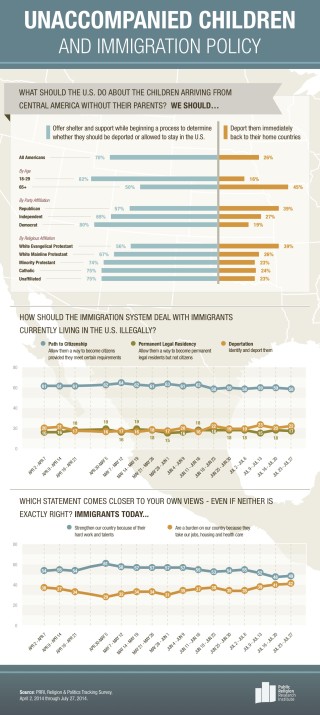Reports indicate that more than 50,000 children from the Central American countries of Guatemala, Honduras and El Salvador have crossed the United States border since October 2013. The question about how  to handle the situation has been hotly contested in recent months—on the Hill and in the headlines. A new survey released on July 29, 2014 by the Public Religion Research Institute finds that, when asked how the U.S. should respond, 7-in-10 (70 percent) Americans say the U.S. should offer shelter and support to children coming from Central America while beginning a process to determine whether they should be deported or allowed to stay. However, more than one-quarter (26 percent) Americans believe these children should be deported immediately back to their home country.
to handle the situation has been hotly contested in recent months—on the Hill and in the headlines. A new survey released on July 29, 2014 by the Public Religion Research Institute finds that, when asked how the U.S. should respond, 7-in-10 (70 percent) Americans say the U.S. should offer shelter and support to children coming from Central America while beginning a process to determine whether they should be deported or allowed to stay. However, more than one-quarter (26 percent) Americans believe these children should be deported immediately back to their home country.
Majorities of Democrats (80 percent), independents (69 percent), and Republicans (57 percent) favor offering support to unaccompanied children while a process to review their cases gets underway. However, nearly 4-in-10 (39 percent) Republicans favor deporting these children immediately back to their home countries.
Majorities of all major religious groups—including white evangelical Protestants (56 percent), white mainline Protestants (67 percent), minority Protestants (74 percent), Catholics (75 percent), and the religiously unaffiliated (75 percent)—prefer that the government offer these children shelter and support while their cases are being decided.
In contrast, the survey reveals stark generational divisions. Younger Americans are much more likely than older Americans to favor offering support to the children. More than 8-in-10 (82 percent) young adults (age 18 to 29) say the U.S. should offer support to these children while beginning a process to review their cases. In contrast, seniors (age 65+) are divided over whether they should be deported immediately (45 percent) or allowed do stay while their cases are being reviewed (50 percent).
Despite the consensus of opinion about how the U.S. should treat unaccompanied minors from Central America, the situation appears to negatively impact Americans’ overall view about immigrants. In early July 2014, 55 percent of Americans said immigrants strengthen American society with their hard work and talents, compared to 49 percent today. Over the same time period, the number of Americans who believe immigrants are a burden because they take our jobs, housing and health care has increased from 35 percent to 42 percent.
However, the decline in positive views of immigrants thus far has had negligible influence on support for a policy that would allow a path to citizenship for immigrants living in the country illegally. From July 2-6, 2014, 58 percent of Americans said they prefer a policy that allows immigrants living in the country illegally to become citizens provided they meet certain requirements; that number is mostly stable today with 58 percent of Americans expressing support for such a policy.